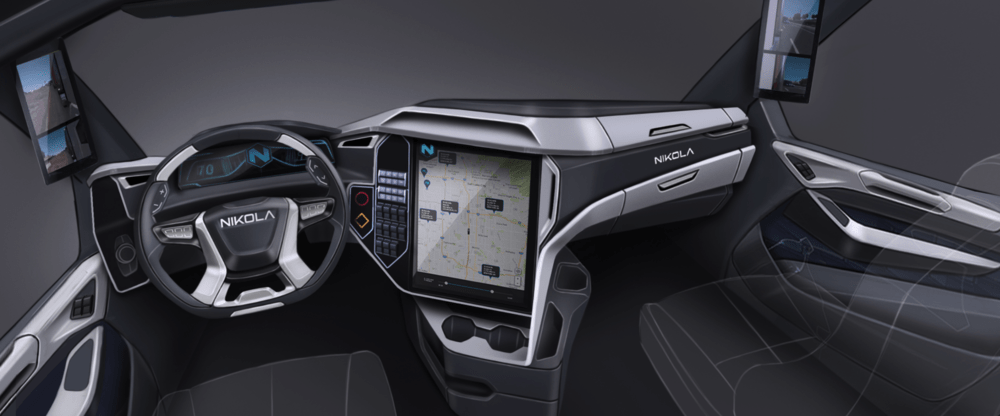America was built on the backs of diesels, but it’s up to this generation to carve a new path. FreightWaves recently did a cross-comparison between battery electric vehicles (BEVs) and hydrogen-fuel cell electrics (FCEVs), and it’s become clear who the winner is. Not only what type, but specifically which company.
A quote by Oren Harari sums up a lot of how CEO Trevor Milton feels about what Nikola has achieved with the hydrogen fuel-cell electric semi: “The electric light did not come from the continuous improvement of candles.”
In other words, a leap had to occur.
Hydrogen is the most abundant element in the universe. Counting the atoms, probably over 90% of all mass is hydrogen. There are no emissions from hydrogen, only water. The Nikola One FCEV can go up to 1200 miles on a full-range charge.
This semi is not just a pusher, but a fully automated vehicle to keep up with the technology innovations of the times. First, they asked drivers what they wanted most in a new truck. A larger cabin was one of the most sought after features. By removing the diesel engine, redesigning the cab and moving the driver forward, Nikola has added nearly 30% more cabin space for optimal comfort.
In production, they’ll have 21-inch monitors. All Wifi-4G connectivity. It’ll give them full real-time data. They’ll be able to see all their freight in the vehicle. There’s a full smart computer within every truck. The freight system will be brokers all over the world onboarded into the truck. Milton estimates that it will increase driver’s pay from somewhere between 25%-50%.

“The electric light did not come from the continuous improvement of candles.”
It’s something like an electric locomotive. Locomotives were actually Milton’s inspiration. He grew up with his dad managing the Union Pacific railroad. At an early age he’d get behind the wheel with the engineers and experience the power of the locomotives.
While the power of the Nikola One engine could technically get as much as 3000 horsepower, software limits it to about 1000 mainly for safety. 2000 foot pounds of torque is typical for most diesel engines. After gear reduction you’re almost at 2000 pounds of torque, which is almost immediate. There is no torque curve with an electric engine. That basically puts this engine from 0-60 in under 30 seconds under full load.
The truck also has regenerative braking, which creates energy and gives it back to the engine. So there’s also 2-3 times the power of the brake over conventional brakes.
While they want to do 50,000 on an annual basis, to Milton the hardest part is behind them: building the business plan for a hydrogen-electric engine. Scaling and manufacturing has plenty of headaches, but according to Milton, is actually not the hardest part. It’s doing what they’ve already done.
“This is for all the thinkers and inventors and entrepreneurs who didn’t stop after their first failure. We failed and we failed and we failed; and then we succeeded,” says Milton.
But it’s other parts of the business plan that are possibly just as brilliant. Only $1500 gets you a reservation, but it’s the low-risk cost of ownership that makes it such a no-brainer. The fuel is included with the truck, guaranteed for the first million miles. You’ll spend $500k just on diesel over that mileage at $2.50 per gallon with a conventional truck. Basically, it’s like having the truck for free over the course of each lease period.
“This is for all the thinkers and inventors and entrepreneurs who didn’t stop after their first failure. We failed and we failed and we failed; and then we succeeded.”
The average truck lease is going to be between $5,000 and $7,000 a month. Full coverage for a truck for a million miles or an 84-month lease.
364 hydrogen fuel stations will be in development probably for the next 5-8 years. Milton sees it taking years, but not 10 years.
If it’s immediate disruption you’re looking for, look no further than FCEVs. They’re hot on the trail for making long-range plans for long-range distances, and Nikola is clearly leading the way.
Stay up-to-date with the latest commentary and insights on FreightTech and the impact to the markets by subscribing.
